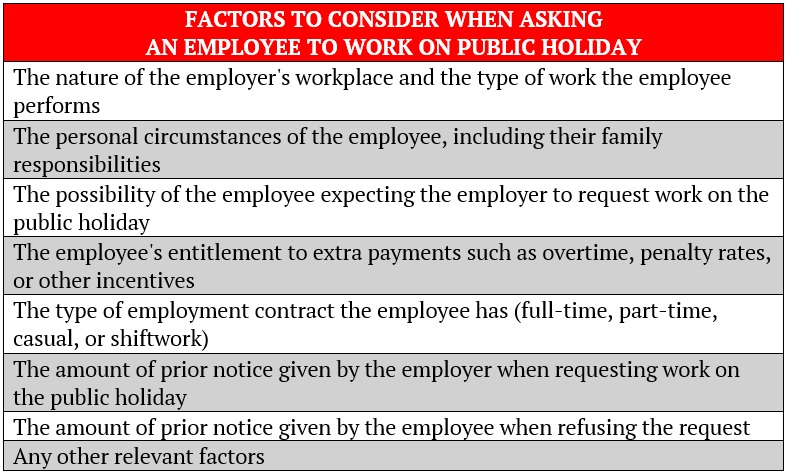
Knowing the dates public holidays in Australia fall on is crucial – they can have different pay rates and benefits than regular workdays

Updated January 9,2024
Getting acquainted with how public holidays work in Australia is a crucial step in fulfilling your obligations to employees. Being aware of the dates of public holidays each year is essential as these may entail different pay rates and entitlements.
HRD breaks down what employers need to know about public holidays in Australia. We’ll go through each state and territory’s public holidays, provisions when a holiday falls on a weekend, and whether they have bank holidays or not.
Public holidays are part of the National Employment Standards (NES). The NES applies to all employees covered by the national workplace relations system, regardless of any award, registered agreement, or employment contract.
Australia has eight public holidays under the NES:
Each state and territory government declares its own public holidays separately. The public holidays you observe may vary based on the state or territory where your business operates. You can check the NES Public Holidays website for more information.
There are 13 public holidays in the Australian Capital Territory for 2024:
The ACT observes bank holidays as per the Holidays Act 1958, alongside the public holidays mentioned above.
The first Monday in August is recognized as a bank holiday. However, bank holidays don’t apply to everyone. That's why it’s advisable for employers and employees to refer to the Holidays Act 1958 and their relevant Enterprise Agreement or Award for further information on bank holidays.
NSW has 12 public holidays lined up for 2024:
If New Year's Day, Christmas Day, or Boxing Day falls on a Saturday or Sunday, then there will be an extra public holiday on the following Monday or Tuesday.
Similarly, the public holiday standard in the Public Holidays Act 2010 provides that if Australia Day falls on a weekend, the public holiday is moved to the following Monday.
Anzac Day is always observed on the 25th of April, regardless of the day of the week.
There are 14 public holidays with two part-day holidays in the Northern Territory for 2024:
Regional holidays are public holidays observed in the regions on their respective annual show days. There are five regional show day holidays in NT:
Queensland has declared 13 public holidays with a part-day holiday in 2024:
In Brisbane, the Royal National Agricultural (RNA) Show Day is celebrated on the Wednesday during the RNA Show period. The RNA Show begins on the first Friday of August, unless it falls before the 5th of the month, in which case it starts on the second Friday of August.
Since 2016, the Holidays Act 1983 has specified that the Labour Day public holiday is to be observed on the first Monday in May. The Birthday of the Sovereign (King's Birthday) public holiday is to be observed on the first Monday in October.
Since Christmas Day 2011, the Holidays Act 1983 has allowed for an additional public holiday when Christmas Day, Boxing Day, or New Year's Day falls on a weekend.
South Australia has 13 public holidays lined up for 2024, two of which are part-day holidays:
If New Year's Day, Australia Day, Christmas Day, or Proclamation Day falls on a Saturday, the public holiday is rescheduled to the following Monday. Saturday is not observed as a public holiday but is still considered a bank holiday.
If New Year's Day, Australia Day, Anzac Day, or Christmas Day falls on a Sunday, both that day and the following Monday will be observed as public holidays and bank holidays.
When Proclamation Day falls on a Sunday or Monday, both that day and the following Tuesday will be observed as public holidays and bank holidays.
For industrial purposes, the provisions governing Sunday included in an Award or Enterprise Agreement will generally take precedence over the provisions governing public holidays unless stated otherwise.
Employees who work between 7pm and 12 midnight on Christmas Eve and New Year's Eve are entitled to receive public holiday rates based on their relevant Award or Enterprise Agreement. The rule applies even if these holidays fall on a Saturday or Sunday.
For part-day public holidays for workers covered by the national workplace relations system, the Public Holidays NES applies.
There are 10 public holidays in Tasmania for 2024:
When New Year’s Day, Australia Day, Christmas Day, or Boxing Day fall on a weekend, the holiday is observed on the following Monday, or in some cases Tuesday. The following arrangements apply:
Some parts of Tasmania celebrate regional holidays:
The following are declared public holidays in Victoria for 2024:
The Friday before the AFL Grand Final typically occurs on the last Friday in September. To confirm the exact date for the 2024 AFL schedule release, check the official website of the State Government of Victoria.
Unless a non-metropolitan municipality arranges for an alternate local holiday, the Melbourne Cup public holiday applies to all of Victoria.
There are 11 public holidays in WA for 2024:
If New Year's Day, Anzac Day, or Christmas Day lands on a Saturday or Sunday, the next Monday will be observed as a public holiday.
If Boxing Day is on a Saturday, the next Monday will also be considered a public holiday. If it falls on a Sunday or Monday, the next Tuesday will be considered a public holiday as well.
Certain regional areas in Western Australia have traditionally observed the King's Birthday public holiday on a different date. This is usually done to coincide with an important occasion or event in that area.
Once announced, the official website of the Government of Western Australia will provide the dates for the 2024 regional King's Birthday public holiday.
Yes. By law, all employees in Australia are entitled to take the day off on public holidays. However, employers can ask employees to work on a public holiday if the request is reasonable.
When working on public holidays, employees are guaranteed to receive at least their base pay rate. And depending on the industry and employment agreements, they may also receive additional benefits including:
If an employee is absent from work on a public holiday, they are entitled to receive their base pay rate for the ordinary hours they would have worked. This is regardless of whether they are full-time or part-time employees.
If an employee doesn't have any ordinary hours of work on the public holiday, they are not entitled to payment.
The Fair Work Ombudsman provides a Pay and Conditions Tool on its website where employees and employers can calculate pay and entitlements.
An employer can request an employee to work on a public holiday based on reasonable grounds. An employee has the right to refuse to work on reasonable grounds.
When deciding whether an employer's request or an employee's refusal to work on a public holiday is reasonable, the following factors must be considered, according to the Fair Work Act:

When a public holiday coincides with an employee's leave, their entitlement to the holiday depends on whether they are taking paid or unpaid leave.
If an employee is on paid leave during a public holiday, they are entitled to receive payment for that holiday, including any hours falling on a part-day public holiday.
However, if an employee is on unpaid parental leave combined with annual leave, they are not eligible for public holiday pay. The public holiday will not be counted as annual or sick leave.
Here are the different instances to consider:
When an employee is on unpaid leave, they do not receive payment for any public holidays during that period.
Because on the varying state and territory rules, public holidays in Australia can be a bit complex. HR leaders must remain vigilant year after year to make sure that employees at their workplace are getting the holiday benefits and compensation that they are entitled to.
You can keep abreast of the latest updates on employee rights and employment regulations by visiting our Employment Law News Section. Here, you can find breaking news and the latest developments on Australia’s workplace legislation.
Do you have any questions about public holidays in Australia? Let us know in the comments section below.